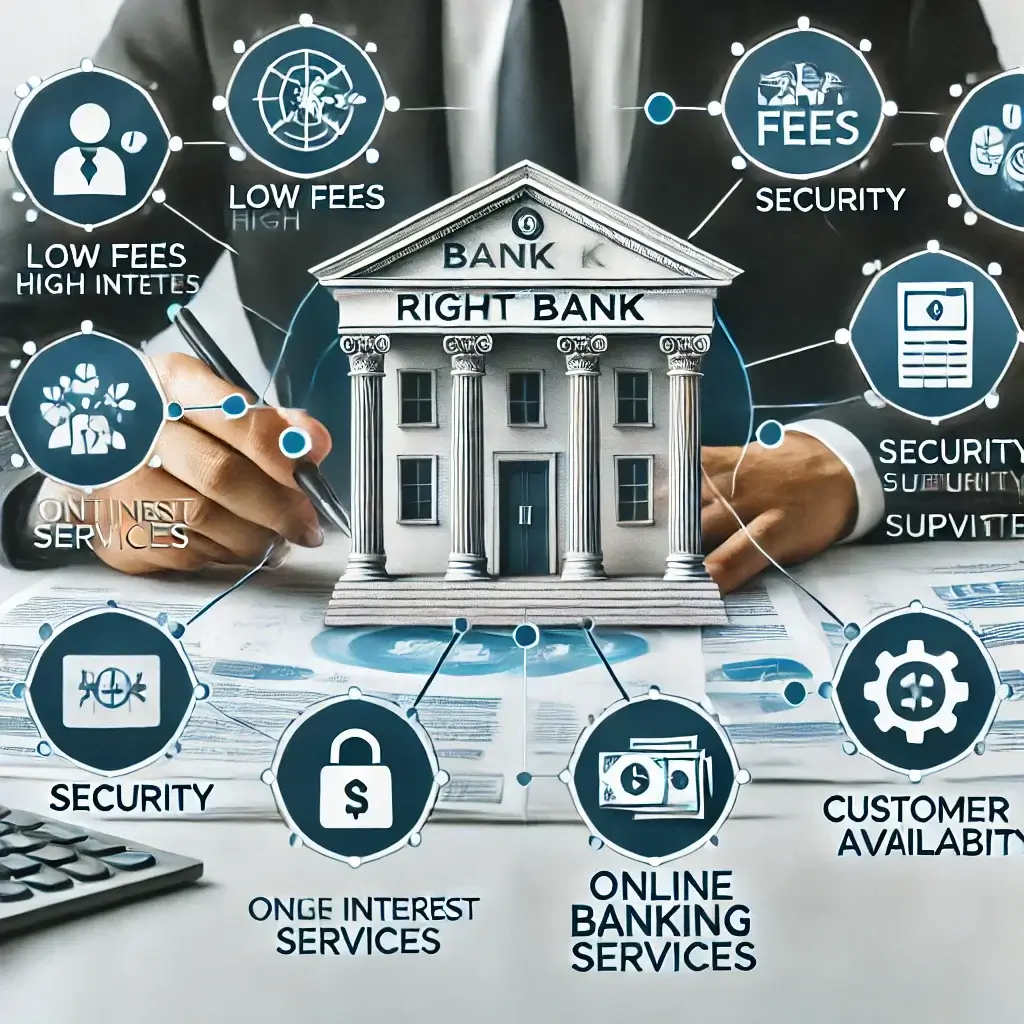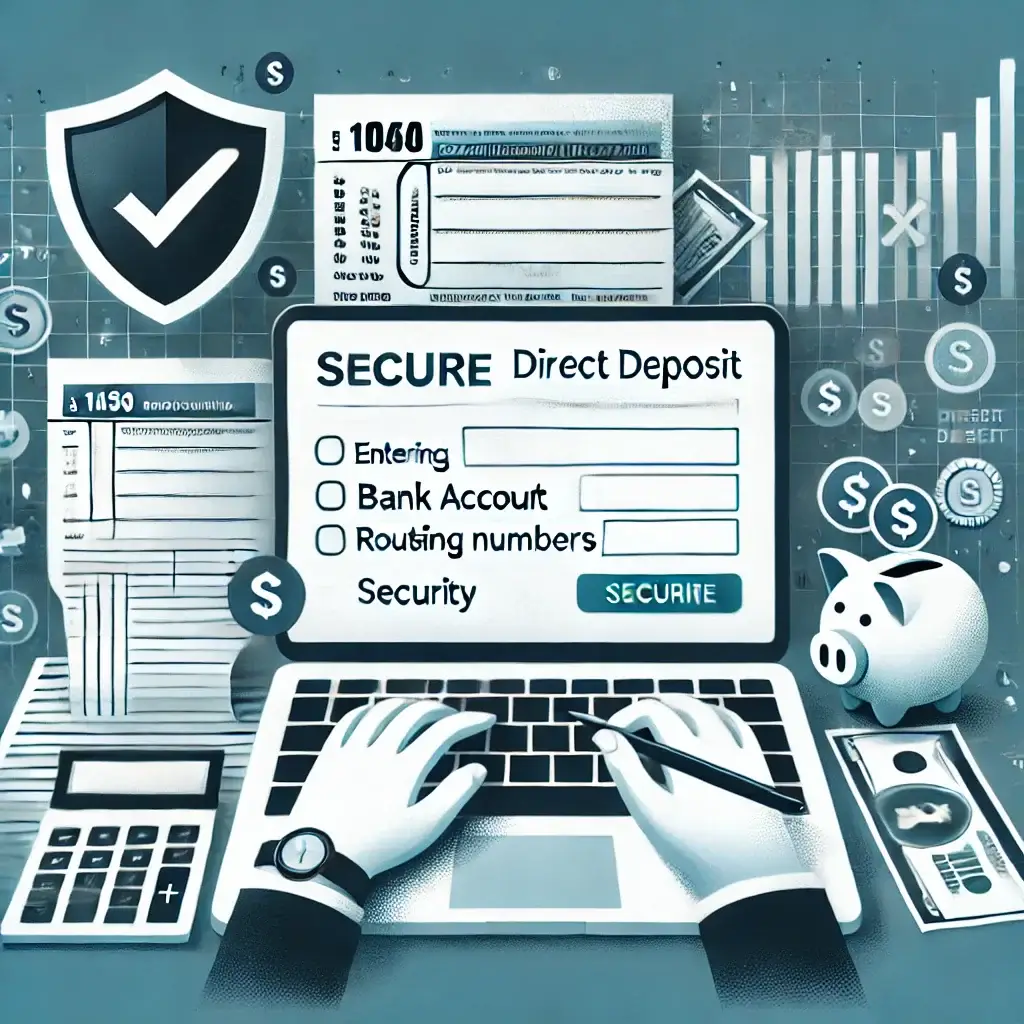Picking a bank is one of those choices that may not look like a huge deal in the beginning, but it can make an enormous difference in your financial life. Whether you're opening an initial account, transferring to a new bank, or simply seeking out improved alternatives, having an understanding of what are some of the things you should look for when selecting the right bank? is instrumental in making the best decision. With all those banks available—large national corporations, local credit unions, and even online institutions—it's natural to feel stumped. Don't worry! I'm here to simplify it for you in a human sort of way. Let's get into the nitty-gritty so that you can find the ideal bank for your situation.
H2: Why Does Choosing the Right Bank Matter?
Let's consider why this choice is so critical before we get into the nitty-gritty. Your bank isn't a dumping ground for your money—it's a money-handling partner. From daily transactions to planning for the future, the right bank can simplify life, but the wrong one can make you frustrated with charges, substandard service, or restricted access. So,what are some of the things you should look for when selecting the right bank? It's all about striking a balance between convenience, affordability, and services that suit your lifestyle.
H2: Key Factors to Consider When Choosing a Bank
Let's cut to the chase. Here are the key things you need to consider when selecting a bank. I'll run through each of them so that you can understand what are some of the things you should look for when selecting the right bank?
H3: 1. Fees and Costs – What Are You Really Paying For
Banks profit in all kinds of ways, and one of the largest is with fees. When you're trying to figure out what are some of the things you should look for when selecting the right bank?. Keep an eye out for:
Monthly maintenance fees: Some banks will charge you just for having the account. Find out if there's a means to waive it, such as maintaining a minimum balance.
ATM fees: Will you be charged every time you take cash out from an out-of-network ATM?
Overdraft fees: These will cost you money in a hurry if you accidentally overspend.
Transaction fees: Certain accounts cap free transactions—read the fine print.
A good bank will be upfront about its fees. Compare a few options and see which one keeps your costs low. After all, no one wants their hard-earned money eaten up by sneaky charges.
H3: 2. Accessibility – How Easy Is It to Use Your Bank?
Coming up on the list of what are some of the things you should look for when selecting the right bank?. Can you access your money when you need it? Here's what to look at:
Branch locations: If you prefer person-to-person service, ensure there is a branch in your vicinity.
ATM network: An extensive network of fee-free ATMs is a lifesaver.
Mobile and online banking: In 2025, having a good app is essential. Can you check your balance, pay bills, or deposit checks using your phone?
If you're on the move constantly or you live in a rural area, an online bank may be the better option. But if you like speaking to people face-to-face, a local bank or credit union may be your best bet.
H3: 3. Interest Rates – Making Your Money Work for You
When shopping around for what are some of the things you should look for when selecting the right bank? . From a savings account to a loan, rates count. For savings, consider:
High-yield accounts: Different banks pay higher rates.
Compounding frequency: Daily or monthly compounding can increase your earnings in the long run.
Conversely, if you require a credit card or loan, examine their interest charges. A bank offering competitive rates can pay for themselves in the long term.
H3: 4. Customer Service – Will They Have Your Back?
Poor customer service can make a routine banking activity a nightmare. So, what are some of the things you should look for when selecting the right bank? Ask yourself:
Availability: Can you call them 24/7 by phone, chat, or email?
Reputation: Check reviews online. Are customers satisfied with the service?
Problem resolution: How fast do they resolve problems such as lost cards or billing mistakes?
Having a bank with helpful, friendly staff can be all the difference if something goes amiss.
H3: 5. Account Options – Do They Suit Your Needs?
Every bank doesn't have the same account options available. When trying to determine some of the things you need to consider when choosing the proper bank, consider what are some of the things you should look for when selecting the right bank? :
Checking accounts: Look for no-fee options with perks like free checks or bill pay.
Savings accounts: High interest rates and easy access are a win.
Specialty accounts: Need a business account, student account, or joint account? Make sure they’ve got it.
Pick a bank that grows with you—whether you’re saving for a house, starting a business, or just keeping your paycheck safe.
H2: Online vs. Traditional Banks – Which Is Right for You?
Today, you have more options than ever. Online banks are springing up all over the place, but old-fashioned brick-and-mortar banks still have their loyalists. So,what are some of the things you should look for when selecting the right bank?
Online banks: They tend to charge lower fees and pay higher interest rates because they don't have branches. But you won't have face-to-face assistance, and cash deposits can be problematic.
Traditional banks: They have branches and ATMs, with a personal touch. The drawback? More fees and less on savings rates are typical.
Consider your routine. If you're high-tech and don't use cash much, an online bank could be ideal. If you prefer walking into a branch, traditional is the way to go.
H2: Security – Is Your Money Safe?
Let's discuss something really important: safety. When you're asking what are some of the things you should look for when selecting the right bank?, security should never be an afterthought. Here's what to look for:
FDIC insurance: In the United States, this insures your money up to $250,000 per account in case the bank fails.
Fraud protection: Do they have alerts, two-factor authentication, or rapid card replacement?
Cybersecurity: Online banks need top-notch digital security.
Your good conscience is worth the premium. Ensure your bank supports you in case things go terribly wrong.
H2: More Frills and Options to Make You Smile
A few banks exceed expectations with bells and whistles. In thinking about what are some of the things you should look for when selecting the right bank?, look for:
Rewards programs: Cashback on debit card purchases or points for spending.
Financial tools: Budgeting apps, credit score tracking, or investment options.
Sign-up bonuses: Some banks offer cash just for opening an account and meeting a few requirements.
These perks aren’t deal-breakers, but they can tip the scales if you’re torn between two options.
H2: How to Research and Compare Banks
Now that you have an idea of what are some of the things you should look for when selecting the right bank?, how do you actually go about finding the best one? Here's a straightforward plan:
Make a list: Jot down what is most important to you—low fees, good rates, branches close by, etc.
Check websites: Most banks publish their fees, rates, and features on the web.
Read reviews: Read what other customers have to say about their experience.
Ask people: Friends and relatives may have suggestions.
Call or visit: Try their customer service for yourself.
Be patient—hasty decision on a bank can leave you with one that is not suitable for you.
H2: Common Mistakes to Avoid When Choosing a Bank
Despite all this information, it's simple to make a mistake. Here are some traps to avoid when determining what are some of the things you should be on the lookout for when choosing the proper bank:
Overlooking fees: Little fees accumulate over time.
Forgetting fine print: Read the terms so you won't be surprised later.
Pursuing bonuses: A large sign-up bonus isn't worth it if the account is crap long-term.
Sticking with what you know: Just because you've always gone with one bank doesn't mean that it's still the best.
Stay sharp and keep your priorities in mind.
H2: Final Thoughts on Selecting the Right Bank
Ultimately, the right bank is the one that suits your lifestyle. By keeping in mind what are some of the things you should consider when choosing the right bank—such as fees, convenience, interest rates, customer service, and security—you'll be ready to make a decision you won't regret. It's not about getting the most flashy bank with the most commercials; it's about getting one that suits you, every day.
So breathe deep, do a little research, and choose a bank that you feel comfortable with. Your wallet will be grateful later. Have any questions on what are some of the things you should look for when selecting the right bank? Feel free to explore further—there's always more to discover!
1. Why do you have to select the right bank?
Answer: Selecting the right bank is a big thing because it influences how you deal with your money on a daily basis. When considering what are some of the things you should look for when selecting the right bank?, it's all about selecting one that makes your financial life simpler, not more complicated. A good bank can save you money in fees, provide you with easy access to your money, and even make your savings grow with reasonable interest rates. Conversely, choosing the wrong one can mean having to pay hidden fees, awful customer service, or few options that don't suit your needs.
It's like choosing a partner—you want the one who's going to stand by you, not the one who's going to give you headaches.
2. How do fees affect my choice when choosing a bank?
Answer: Fees can catch you off guard and devour your money if you're not paying attention. That's why, in asking what are some of the things you should look for when selecting the right bank?, you have to make fees a priority. Consider monthly account fees—banks will charge you for merely having an account, but others won't if you maintain a specified balance. There are also ATM fees, overdraft fees, and even charges for things such as paper statements.
Low-or-no-fee banks can save you hundreds in the long run.
Compare a couple of them, read the fine print, and choose one that does not nickel-and-dime you for everything.
3. Online bank or a brick-and-mortar bank?
Answer: That is a huge question, and it depends on what you consider important. In determining what are some of the things you should look for when selecting the right bank? , consider how you spend your money. Online banks tend to have fewer fees and more interest because they don't have branches to keep up. They're wonderful if you're comfortable with apps and don't need cash very often. Traditional banks, however, offer you branches and ATMs you can go to, along with that human touch if you prefer speaking with someone in person.
The catch?
They may charge more. Balance your habits—if you're a digital convenience kind of person, go online; if you prefer face-to-face assistance, use old-school.
4. How important is customer service in selecting a bank?
Answer: Customer service can make or break your banking experience. Don't miss this one when considering what are some of the things you should look for when selecting the right bank?.
Imagine your card gets lost or there’s a weird charge on your account—will the bank fix it fast, or leave you on hold for hours?
Look for a bank with 24/7 support, whether it’s by phone, chat, or email. Check reviews online to see if people rave about the service or complain about it. A bank that's present when you're in need can spare you plenty of headaches, so try them out for response before you take the plunge.
5. How do I know if a bank is safe for my money?
Answer: Safety is giant when you're putting your dough in someone else's hands. When looking around at what are some of the things you should look for when selecting the right bank?, security should rank high on the list.
First, ensure that the bank's FDIC-insured—that's your money is safe up to $250,000 if the bank fails. Second, check their fraud protections—do they provide alerts on suspicious activity or two-factor verification? For online banks in particular, robust security is important. You want the confidence that your savings won't vanish because of a hack or bank failure, so look at their safety protocols before you enroll.
6. Do interest rates really count when choosing a bank?
Answer: Interest rates may not be thrilling, but they can actually mean a lot in the long run.
When asking what are some of the things you should look for when selecting the right bank? take a good look at what are some of the things you should look for when selecting the right bank?—some banks, particularly online banks, offer you significantly more than the paltry 0.01% you may find elsewhere. If you're lending, such as with a loan or credit card, lower rates save you money. Shop around for rates at a couple of banks and consider the long term—tiny differences can make a big impact, particularly if you're saving or borrowing large amounts. 7. What kinds of accounts do I want to find in a bank?
Answer: Not every bank has the same accounts, so this is an important part of the puzzle.
When considering what are some of the things you should look for when selecting the right bank?, consider what you need today and in the future. A no-fee basic checking account is essential for everyday use, but what happens with savings? Seek out the high-yield ones. If you're in school, a business owner, or need a joint account with your spouse, ensure they offer those as well. A flexible bank with various account options will be able to adapt with you as your situation changes, so you're not left having to switch later on.
8. How much priority do you place on access to ATMs and branches?
Answer: Availability of your cash is a practical concern. When considering what are some of the things you should look for when selecting the right bank? consider how you'll access cash or deal with in-person business. If you hit the ATMs frequently, choose a bank with a large, free network—those out-of-network charges can hurt. Branches are important if you prefer to deposit checks or speak with a teller.
Online banks may not have either, which is okay if you're digital-first, but inconvenient if you work with cash regularly.
Match the bank's arrangement to your daily routine for optimum convenience.
9. Will bank benefits influence my choice?
Answer: Benefits aren't all, but they can make the deal sweeter. When considering what are some of the things you should look for when selecting the right bank?, watch for extras. A few banks provide cashback on debit transactions, sign-up rewards (such as $200 to open a new account), or resources such as budgeting software. These aren't the deciding factor in picking a bank, but if you have two good options and are torn, a nice bonus could be the tie-breaker .Just don't be blinded by a flashy bonus to ignore high fees or poor service—prioritize the fundamentals first.
10. How do I begin to research banks to select the best one?
Researching banks doesn't have to be daunting if you divide it up.
When considering what are some of the things you should look for when selecting the right bank?, begin by compiling your requirements—perhaps low fees, decent rates, or convenient ATMs nearby.
Tap into bank websites to see what they are offering and their fees. Read online reviews to see what real people say—happy customers are a good sign. undefined Ask friends or family for their picks, too. undefined Then, narrow it down to a few and call or visit to test their vibe. undefined It’s like shopping for a car—take your time, test-drive your options, and pick the one that feels right.




